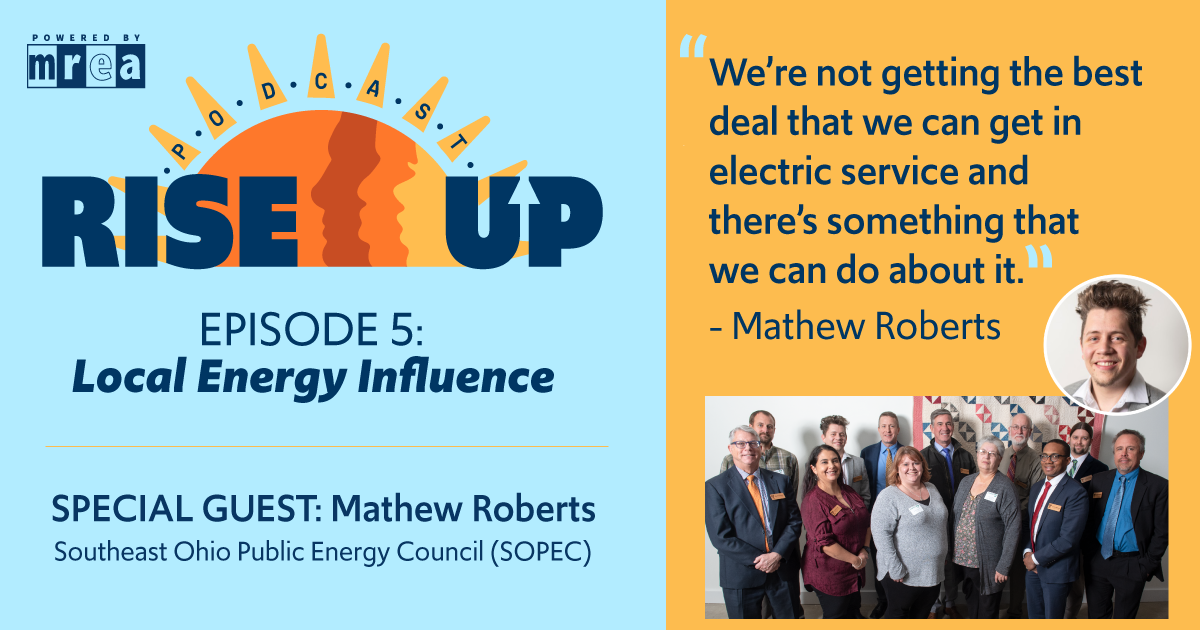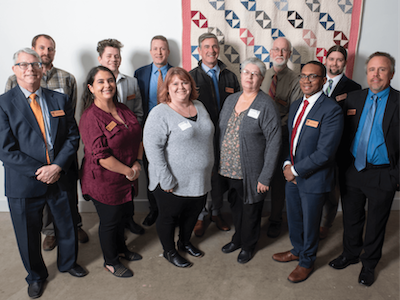
LOCAL ENERGY INFLUENCE
Season 1: Episode 5
How can your community gain influence over how your energy dollars are spent? It’s not easy. In this episode, we discuss how jurisdictions are harnessing their economic and political power to get more local, clean energy. We speak to Mathew Roberts from the Southeast Ohio Public Energy Council (SOPEC) about how the regional council of governments is making energy decisions locally.
Nick Hylla, MREA Executive Director
Jordan Pupols, MREA Events Manager
Episode Resources:
Subscribe:
Signing up for our Action Alerts means you’ll be alerted as soon as the latest episode is available for listening on our website.
About This Epis0de
Most homes and businesses are not energy consumers but rather ratepayers. Unlike consumers, ratepayers do not have a choice in who they purchase products and services from. You are a business owner that doesn’t like how your utility is changing your electricity rate to devalue energy efficiency? Too bad. The wires and meter connected to your building are owned by a single utility that enjoys monopoly control in your area. You are a homeowner that doesn’t like how your utility company has been lobbying at the state capitol to reduce home and business solar ownership? So sorry. They are your only choice for electricity.
Nearly 100 years of investment inertia have pushed the “natural monopoly” of the electric utility into the modern era of energy efficiency, distributed solar, energy storage, and smart grids. When considering the critical importance of reliable electricity to modern life, the growing complexity of the electricity grid, the pressing need to transition away from fossil fuels, and the very real interests of utility investors in maintaining their returns, it is hard to see how homes and businesses can gain more influence over their energy choices.
Yet, states and jurisdictions across the US are advancing policies and programs that increase competition, foster innovation, and provide more customer choice. One such policy is known as community choice aggregation, which allows voters to decide whether they want to collectively choose their electricity supplier through a competitive bidding process. Now available in seven US states including the Midwest states of IL and OH, the process is proving effective at reducing electricity costs and securing carbon free power. And, in the case of the Southeast Ohio Public Energy Council (SOPEC) can help build awareness of and investment in new opportunities that develop local clean energy generation.
SPECIAL GUEST: Mathew Roberts

Mathew Roberts serves as the SOPEC Director of Marketing, coordinating and executing SOPEC’s broad marketing and outreach strategy. Mat manages SOPEC’s renewable energy programs and assists with special projects for member communities.
ABOUT SOPEC:

Southeast Ohio Public Energy Council (SOPEC) was established in 2014 by local governments in Southeast Ohio to increase efficiency by providing shared administrative, financial, and legal services required for high-value public energy programs.
EPISODE RESOURCES:
On SOPEC Programs and Initiatives:
About SOPEC: SOPEC is a Regional Council of Governments (COG) that provides public energy services to the Southeast Ohio region. As a nonprofit COG, they have used the state’s energy aggregation law to collectively purchase electricity on behalf of the communities it serves.
Communities across Ohio opt for Community Choice Aggregation (CCA): SOPEC is possible due to a 1999 law which changed to enable utility customers to choose an electricity supplier separately from their utility. For more background information on CCA, review the EPA page explaining the concept.
Athens Carbon Fee – What Is It? In 2018, voters in the City of Athens approved the opt-out carbon fee to be charged on electric utility usage within the City of Athens. Money collected will fund solar PV systems on public buildings in the city.
SOPEC’s Sponsored Energy Projects: As a part of its public service mission, SOPEC sponsors the development of regional energy projects in its member communities. To date, SOPEC sponsored projects have primarily focused on solar PV facilities and biogas facilities. Learn more about these projects.
On Midwest Clean Energy Policy Scandals
Indiana’s Phase Out of Retail Rate Net Metering: In 2017, Indiana Gov. Eric Holcomb (R) signed into law this week a measure which lowers the retail rate compensation for residents who install devices to use solar or wind power, ultimately phasing out retail net metering.
The Ohio Utility Scandal, Explained: Ohio HB 6, passed in July 2019, essentially gutted Ohio’s renewable and energy efficiency laws and incentives and bailed out several coal and nuclear companies. In August 2020 it came to light that the bill was bought and paid for by Ohio utility, FirstEnergy.
Battles Over Fixed Charges Proliferate Across Midwest in Wake of Wisconsin Cases: This 2015 article in E&E News gives background and context to the slur of fixed charges that became rampant in WI utilities, which eliminated and reduced competition of solar distributed generation.
Kansas Utility Continues to Collect to Collect Fee on Solar Customers Despite Court Ruling: Five months after the Kansas Supreme Court ruled it illegal, Evergy continues to collect a demand fee from customers who own solar panels.
On Recent Related Local Energy News Stories:
Minneapolis Seeks Inclusive Financing for Energy Efficiency Improvements – August, 2020: A proposal before state regulators would create a Pay As You Save program to help more homeowners afford efficiency upgrades.
“We’ve already done so much, and a lot of tide is shifting, and a lot of opportunity is coming where we can be prepared to take action for the good of the people and the good of the planet.”
– Mathew Roberts, SOPEC
The Current System of Electric Billing No Longer Makes Sense – August, 2020: Let’s stop pretending that we’re paying for “energy” via our home power bills and understand that we’re mainly paying for infrastructure.
Propelling the Transition: The Battle for Control of Virtual Power Plants is Just Beginning – August, 2020: As virtual power plants develop, there is a growing debate about the degree to which the future of distributed energy management will be controlled by large utilities or third-party aggregators.
From the Midwest and beyond, the Energy News Network provides daily updates on the transition to a clean energy economy. Sign up for any of our free daily regional newsletters at energynews.us.
For more information on how your organization can sponsor a future Rise Up podcast episode, view the details on the Rise Up Midwest supporter page, or contact Gina.

CONTACT US
Address: 7558 Deer Rd. Custer, WI 54423
Email: info@riseupmidwest.org
Phone: (715)-592-6595
The Midwest Renewable Energy Association (MREA) is a nonprofit organization with the mission to promote renewable energy, energy efficiency, and sustainable living through education and demonstration.

